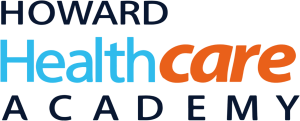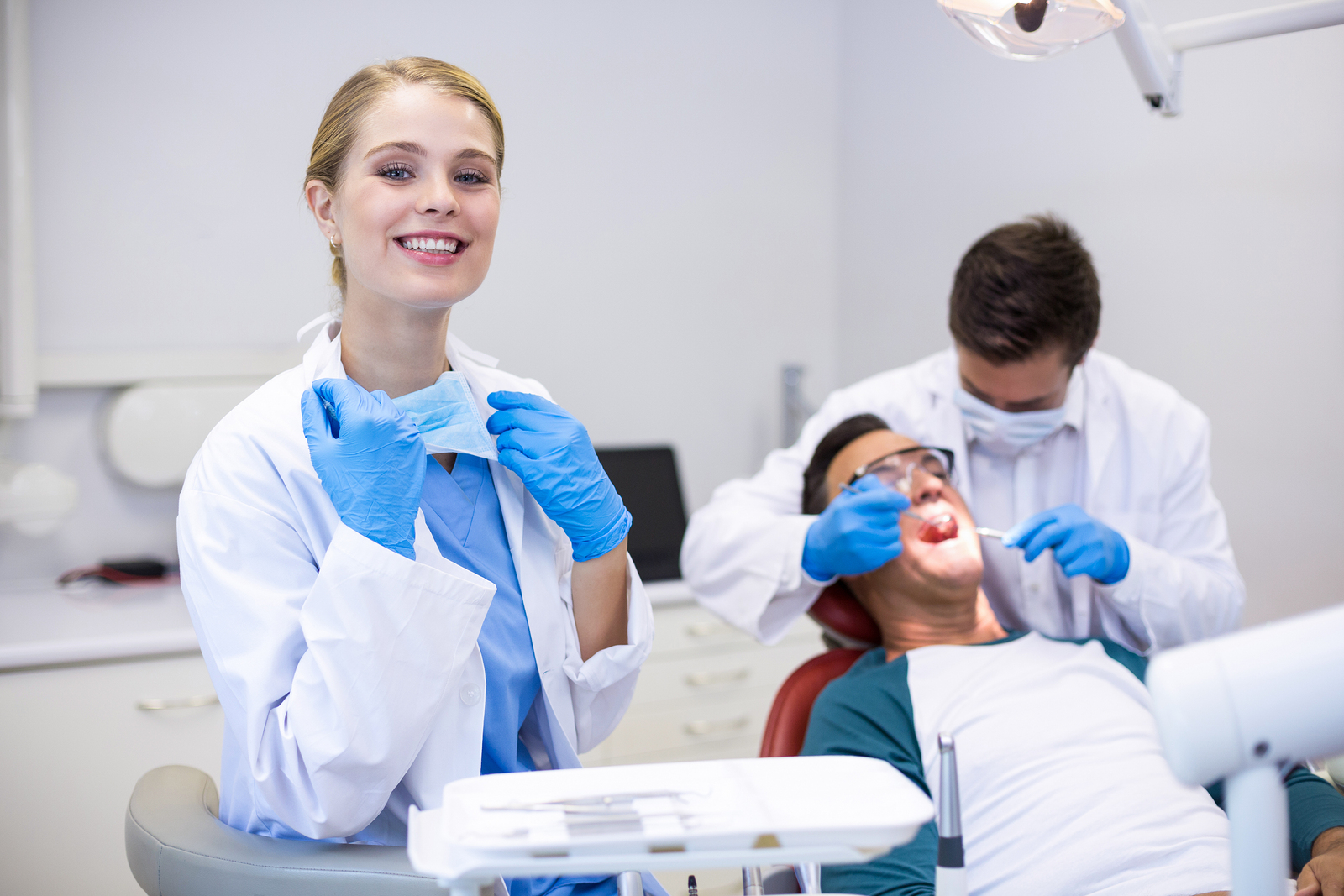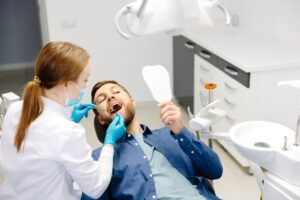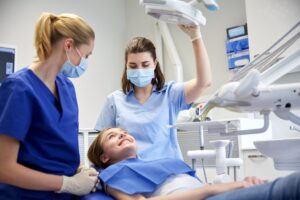Dental assistants and dental hygienists are key contributors at dental practices across the United States. Yet dental assistants and dental hygienists are not interchangeable, though both groups of professionals play vital – and distinct – roles in helping a dental practice optimize its productivity and efficiency.
For those who are considering a career in the dental field, Howard Healthcare Academy can help. Our Dental Assistant Program is offered in partnership with The Super Dentists, San Diego’s premiere pediatric dentistry. We also offer standalone courses for individuals who want to become a dental assistant. Our courses are taught by dental industry professionals and blend hands-on and classroom lessons. As such, our courses help individuals gain the skills and confidence that they need to thrive as a dental assistant.
So, should you pursue a career as a dental assistant or a dental hygienist? To answer this question, let’s consider the day-to-day responsibilities and benefits of working as a dental assistant or a dental hygienist.
What Is a Dental Assistant?
A dental assistant helps a dental practice deliver exceptional oral care to patients. He or she usually possesses comprehensive interpersonal and technical skills. A dental assistant often performs the following day-to-day tasks:
- Assisting a dentist during procedures
- Performing dental X-rays
- Taking a patient’s blood pressure and pulse
- Creating and deploying infection control protocols for a dental practice
- Preparing and sterilizing dental equipment
- Ensuring patients are comfortable before, during, and after treatment
- Providing patients with post-treatment oral care instructions
- Teaching patients how to brush and floss their teeth properly and maintain good oral health
- Taking impressions of patients’ teeth
- Performing office management tasks
- Scheduling patient appointments
- Ordering dental practice supplies
- Handling dental practice billing activities
The Howard Healthcare Academy dental assistant course curriculum prepares individuals for the everyday activities of dental assistants. Our program includes the following courses:
- Dental Terminology and Proper Asepsis: Teaches students about dental terminology, specialties, HIPAA, CPR, and related topics, as well as basic chairside assisting and sterilization best practices.
- Chairside Assistance: Enables students to practice seating and dismissing a patient, handpiece maintenance, and other chairside activities commonly performed at general and specialty dental practices.
- Dental Materials and Prevention: Provides students with insights into preventative medicine, nutrition, oral hygiene, and related subjects.
- California Dental Assisting and Registered Dental Assisting with Expanded Duties Lab: Teaches students about various registered dental assisting functions, including regulations, categories, and legalities.
- Dental Radiology: Offers insights into the basic principles of radiographic physics, radiographic production, and other dental radiology topics.
- Dental Practice Management: Empowers students with a variety of communication skills, along with insights into non-clinical dental office functions like appointment scheduling and completing insurance forms.
- Clinical and Lab Duties: Allows students to practice pit and fissure sealants, coronal polishing, and other clinical and lab procedures.
- Dental Externship: Involves a 200-hour externship at a private or group dental practice, clinic, or industrial clinic under the direct supervision of a qualified dental professional.
The Howard Healthcare Academy dental assistant course curriculum requires 820 hours to complete. Once a student graduates from the program, he or she possesses the necessary skills and confidence to succeed as a dental assistant. We provide lifetime job placement assistance for our graduates.
Benefits of Working As a Dental Assistant
There are many reasons why people choose to pursue a career as a dental assistant. These reasons may include:
- Every day presents new challenges. For those who want a job where no two days are identical, becoming a dental assistant may be ideal. As a dental assistant, an individual interacts with dental clients and staff and ensures patients receive the support they need to achieve their oral health goals.
- Dental assistants enjoy unprecedented flexibility. A dental assistant can work full-time at a single dental practice. Or, a dental assistant can split up his or her work schedule across multiple dental offices. A dental assistant can even work part-time – something that makes a dental assistant career an appealing option for parents with young children.
- Many job opportunities are available. The U.S. Bureau of Labor Statistics (BLS) projects the dental assistant field will grow at a rate of 19% between 2016 and 2026; BLS also notes the dental field will grow much faster than the national average during the aforementioned time frame. Thus, those who earn a dental assistant certification today could capitalize on a rapidly expanding job field in the years to come.
- Dental assistants may receive paid sick leave, vacation time, and other benefits. Dental assistants may be eligible for medical insurance, paid sick leave, and vacation time, among other benefits.
At Howard Healthcare Academy, we teach individuals about what to expect when they pursue a career as a dental assistant. By doing so, we help people make informed decisions about whether a career as a dental assistant is the best choice based on their individual needs. Then, if a person decides to enroll in our dental assistant course curriculum, we will do everything possible to ensure this individual can build his or her dental assistant skill set.
What Is a Dental Hygienist?
Like a dental assistant, a dental hygienist works in a dental practice. But many of the day-to-day responsibilities of a dental hygienist are far different from those of a dental assistant.
Common day-to-day responsibilities of dental hygienists include:
- Removing plaque from patients’ teeth
- Removing hard and soft deposits from patients’ teeth
- Applying sealants, fluorides, and other preventative materials to patients’ teeth
- Administering local anesthetics
- Taking and developing patient X-rays
- Making impressions of patients’ teeth
- Providing tips and recommendations to help patients maintain good oral health
Dental hygienists have a degree of autonomy with patients, working one-on-one to provide services to supplement the care provided by the dentist(s) in the office. Each state has its own regulations, and the day-to-day duties of dental hygienists sometimes vary based on these mandates. However, regardless of where a dental hygienist works, he or she is responsible for meeting the oral health needs of a dental practice’s patients.
Benefits of Working As a Dental Hygienist
There are many reasons why people become dental hygienists, and these reasons include:
- Dental hygienists are in high demand. Dental hygienists possess in-demand skills and training. As a result, they often can find jobs at both general and specialty dental practices across the United States.
- Dental hygienists can earn a competitive salary. S. dental hygienists earned a median salary of $74,070 in 2017, according to BLS. Meanwhile, BLS reports the number of dental hygienist jobs is projected to increase by 40,900 between 2016 and 2026. As dental practices search for qualified dental hygienists, the average annual salary of dental hygienists may rise accordingly, too.
- Many career advancement opportunities are available to dental hygienists. A dental hygienist requires at least a certificate or associate’s degree to work in a dental practice. This certificate or degree may serve as a dental hygienist’s first step toward a successful career in the dental industry. In fact, a dental hygienist can pursue a bachelor’s or master’s degree. With an advanced degree in hand, a dental hygienist may even pursue a career in research or dental hygiene education.
In addition to our dental assistant course curriculum, Howard Healthcare Academy offers standalone certification courses designed for those in the dental field. Our certificate offerings include Radiation Safety, Coronal Polishing, Ultrasonic Scaling, Pit and Fissure Sealants, and more. Thanks to these standalone certification courses, dental professionals can move closer to achieving their career aspirations.
Howard Healthcare Academy is happy to help individuals who want to become a dental assistant. To find out more about our course offerings or talk to one of our experts, please contact us today at 1 (619) ACADEMY.












